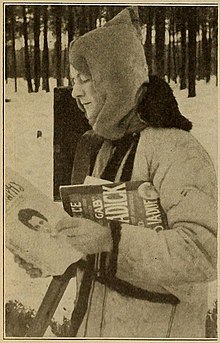Albert K. Dawson
Albert Knox Dawson (September 20, 1885 – February 17, 1967) was an American photojournalist and film correspondent who covered World War I with the German, Austro-Hungarian and Bulgarian Armies.
Early life
[edit]Albert Knox Dawson was born in Vincennes, Indiana, on September 20, 1885. He was the oldest son of Thomas A. Dawson and Lida T. Knox. His father was a local bank officer, contractor and real estate manager.[1]
At an early age, Dawson began experimenting with taking pictures. Out of his fascination with photography grew a professional career as a cameraman.
Career as a photographer
[edit]In 1907, Dawson left Vincennes and after a photographic assignment in Cuba he began working in 1908 for the photographic agency Underwood & Underwood in New York City. In 1912, Dawson started his photographic firm Brown & Dawson which was based in Stamford, Connecticut.
From November 1914 until February 1916, Dawson was a photographer at the European front. His regular news pictures were distributed through his firm Brown & Dawson which specialized in stock photography. His documentary films were released by the American Correspondent Film Company. Dawson contributed to the following motion pictures: The Battle and Fall of Przemysl,[2] The Battles of A Nation,[3] System - The Secret of Success, Friends and Foes, and The Warring Millions/Fighting Germans. He was attached to the German, Austro-Hungarian and Bulgarian armies.
Albert Dawson was among the most active American photographers during World War I. In July 1917, he was among the first photographic officers who received a commission in the U.S. Signal Corps, together with Edwin F. Weigle of the Chicago Tribune and photographer Edward J. Steichen. Dawson was promoted to Captain in November 1917 and put in charge of building the new military photographic laboratory in Washington, D.C. Dawson was also instrumental in training the first official American war photographers.[4]
After the war, Dawson worked in the tourist trade for the American Express Company. During World War II, he was on the staff of the Coordinator of Inter-American Affairs. Albert Dawson died in New York City on February 17, 1967. He was buried at Poughkeepsie Rural Cemetery.
Film work
[edit]Various segments from Dawson's war footage have been found by authors Ron van Dopperen and Cooper C. Graham while researching their book American Cinematographers in the Great War, 1914-1918.[5]
While following the Austro-Hungarian army at the Eastern Front in the summer of 1915, Dawson produced this motion picture report on the Russian trench system that has partly been retrieved by the authors at the nitrate film vaults of the Library of Congress.[6]
During his stay in Berlin, Dawson made still and moving pictures of Roger Casement, the famous Irish nationalist who at the time was involved in raising a revolt in Ireland against the British. Dawson's film was located by the authors in 2016 in the collection of the Library of Congress. These historical scenes taken by Dawson in Berlin in 1915 can be viewed here. The films are the only extant footage showing Roger Casement.[7]
Dawson's film work during World War I featured in the documentary Mobilizing Movies! The U.S. Signal Corps Goes to War, 1917-1919.
Sources
[edit]- Kevin Brownlow, The War, The West and The Wilderness (London/New York 1979)
- Ron van Dopperen, "Shooting the Great War: Albert Dawson and the American Correspondent Film Company, 1914-1918", Film History vol. 2 (1990), 123–129.
- Ron van Dopperen and Cooper C. Graham, "Film Flashes of the European Front: The War Diary of Albert K. Dawson." Film History vol. 23 (2011), 20–37.
- Ron van Dopperen and Cooper C. Graham, Shooting the Great War: Albert Dawson and the American Correspondent Film Company (Charleston, SC 2024, 8th printing) ISBN 978-1-4909-4466-1
- James W. Castellan, Ron van Dopperen, Cooper C. Graham, American Cinematographers in the Great War, 1914-1918 (New Barnet, 2015), doi:10.2307/j.ctt1bmzn8c
- Cooper C. Graham and Ron van Dopperen, “Roger Casement on Screen: the Background Story on an Historical Film Opportunity”, Historical Journal of Film, Radio and Television, online edition 2016, https://doi.org/10.1080/01439685.2015.1100386
Films and photos
[edit]References
[edit]- ^ Dopperen, Ron Van (10 April 2018). "First World War on Film: The Boy from Indiana, Albert K. Dawson". First World War on Film. Retrieved 2021-10-01.
- ^ Dopperen, Ron Van (1 November 2017). "First World War on Film: 'Close-Up – The Battle and Fall of Przemysl'". First World War on Film. Retrieved 2021-10-03.
- ^ Dopperen, Ron Van (20 June 2016). "First World War on Film: 'Lost & Found: The Battles of A Nation (USA, 1915)'". First World War on Film. Retrieved 2021-10-03.
- ^ Dopperen, Ron Van (15 May 2017). "First World War on Film: 'Albert Dawson Training War Photographers, November 1917'". First World War on Film. Retrieved 2021-10-03.
- ^ Castellan, James W.; van Dopperen, Ron; Graham, Cooper C. (2014). American Cinematographers in the Great War, 1914-1918. Indiana University Press. doi:10.2307/j.ctt1bmzn8c. ISBN 978-0-86196-717-9.
- ^ Dopperen, Ron Van (16 July 2016). "First World War on Film: 'Filmed by Albert K. Dawson – The Catacombs of War'". First World War on Film. Retrieved 2021-10-03.
- ^ Dopperen, Ron Van (1 February 2016). "First World War on Film: 'Now Available – How Sir Roger Casement Was Filmed'". First World War on Film. Retrieved 2021-10-03.


 French
French Deutsch
Deutsch